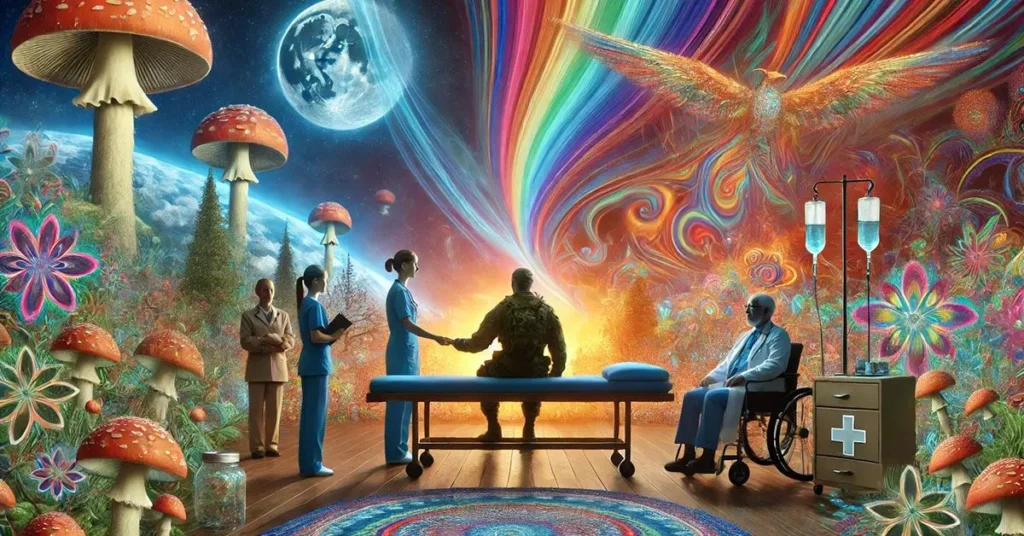In recent years, the resurgence of interest in the therapeutic potential of psychedelics has led to groundbreaking research into their effectiveness in treating a variety of mental health disorders, including Post-Traumatic Stress Disorder (PTSD). This disorder, characterized by persistent mental and emotional stress occurring as a result of severe psychological shock, has traditionally been treated with psychotherapy and medication.
However, for many, these treatments are not wholly effective. This has prompted researchers to explore alternative therapies, including the use of psychedelics such as psilocybin (found in magic mushrooms), MDMA (commonly known as ecstasy), and LSD. This dives deeply into the role of psychedelics in treating PTSD, drawing on the latest research from reputable sources to present a comprehensive overview.
Understanding PTSD
PTSD can occur after a person has experienced or witnessed a traumatic event such as a natural disaster, a serious accident, a terrorist act, war/combat, rape, or other violent personal assault. It is characterized by symptoms such as flashbacks, severe anxiety, uncontrollable thoughts about the event, and nightmares. According to the National Institute of Mental Health, the condition can last months or years, with triggers that can bring back memories of the trauma accompanied by intense emotional and physical reactions.
Psychedelic Therapy: A New Frontier
Recent studies have focused on the use of psychedelics to treat PTSD, showing promising results in reducing symptoms where traditional treatments have failed. The main types of psychedelics being researched for this purpose include:
Psilocybin
Research at leading institutions such as Johns Hopkins has shown that psilocybin therapy can significantly decrease depressive symptoms and anxiety in PTSD patients. The theory is that psilocybin, along with psychological support, can help individuals confront traumatic memories in a safe environment, potentially reorganizing those memories so they cause less harm.
MDMA-Assisted Psychotherapy
MDMA, a psychoactive drug best known for its use in the party scene, has shown significant promise in clinical trials for treating PTSD. Studies have indicated that MDMA-assisted psychotherapy can lead to a marked reduction in PTSD symptoms. MDMA is thought to reduce the fear response and increase trust and insight, which could make psychotherapy more effective. The FDA granted MDMA breakthrough therapy designation for PTSD in 2017, recognizing its potential as a significant treatment advancement.
LSD
While less studied than MDMA and psilocybin, LSD has also been evaluated for its potential to treat PTSD. LSD can induce a profound state of introspection and emotional release, which is considered beneficial in processing traumatic memories during therapy sessions.
The demographics of PTSD sufferers who might benefit from psychedelic therapy are broad, encompassing various backgrounds and experiences:
Military Veterans
Veterans often face high rates of PTSD due to combat exposure. Psychedelic therapy could be particularly beneficial for this group, offering new ways to process their experiences and potentially alleviating symptoms of depression and anxiety that conventional treatments have not resolved.
Victims of Sexual Assault and Abuse
Individuals who have experienced sexual assault or long-term abuse might find psychedelic-assisted therapy beneficial. The empathogenic effects of MDMA, for example, can help patients discuss traumatic memories more openly and with less distress.
First Responders and Healthcare Professionals
The intense nature of their jobs can leave first responders and healthcare professionals particularly susceptible to PTSD. Psychedelic therapy offers a novel treatment avenue, potentially helping them deal with traumatic incidents witnessed in the line of duty.
Survivors of Catastrophic Events
Survivors of disasters such as earthquakes, fires, or severe accidents might also benefit from psychedelic therapies, which can offer profound emotional and psychological relief.
Conclusion
The use of psychedelics in treating PTSD represents a significant paradigm shift in mental health therapy. As research continues and these treatments move closer to widespread clinical approval, they could offer hope to millions of individuals who currently struggle with the debilitating effects of PTSD.
Additional Sources:
1. National Institute of Mental Health, “Post-Traumatic Stress Disorder”: [NIMH PTSD](https://www.nimh.nih.gov/health/topics/post-traumatic-stress-disorder-ptsd)
2. Johns Hopkins Medicine, “Psilocybin Research and Therapy”: [Johns Hopkins Psilocybin Study](https://hopkinspsychedelic.org)
3. U.S. Food and Drug Administration, “FDA Grants Breakthrough Therapy Designation for MDMA-Assisted Psychotherapy for PTSD, Agrees on Special Protocol Assessment for Phase 3 Trials”: [FDA MDMA](https://www.fda.gov)
This thorough exploration of psychedelic therapy’s potential to treat PTSD across different demographics underlines the critical shift towards integrating these treatments into mainstream medical practice. As the body of evidence grows, so too does the potential for these therapies to offer profound healing benefits.

